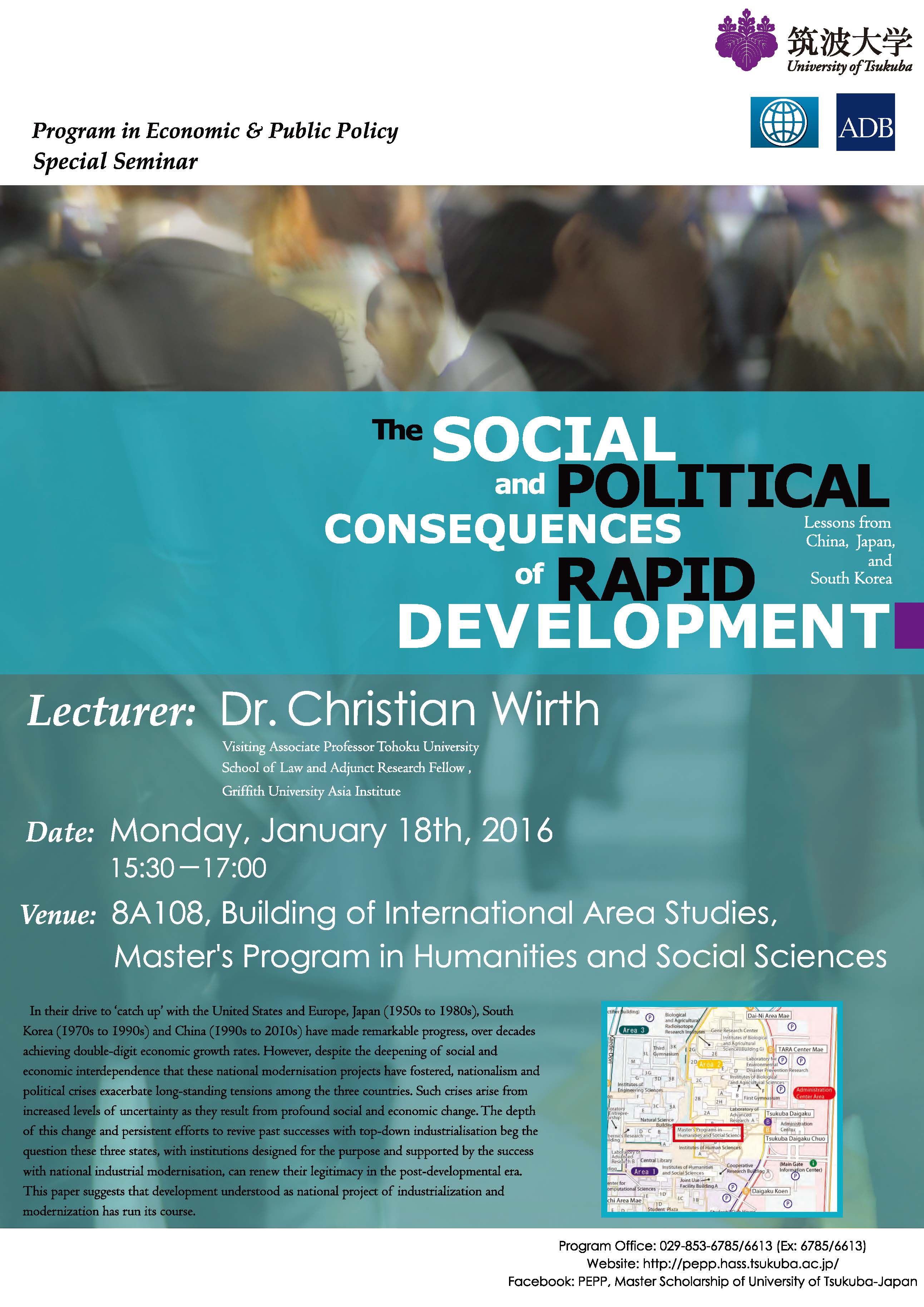PEPP Seminar “The Social and Political Consequences of Rapid Development: Lessons from China, Japan, and South Korea” (Jan. 18)
2015/11/30
Please be invited to the PEPP Seminar scheduled on January 18th, 2016.
—————————————————————————————
Title: “The Social and Political Consequences of Rapid Development: Lessons from China, Japan, and South Korea”
Lecturer: Dr. Christian Wirth,
Visiting Associate Professor, Tohoku University School of Law and Adjunct
Research Fellow, Griffith University Asia Institute
Date: Monday, January 18th June, 2016
Time: 15:30~17:00
Venue: 8A108, Building of Master’s Program in Humanities and Social Sciences
(Map: Find the venue in J7 box)
https://www.tsukuba.ac.jp/english/access/map_central.html
Coordinator: Prof. Jeet Sapkota
Introduction:
In their drive to ‘catch up’ with the United States and Europe, Japan (1950s to 1980s), South Korea (1970s to 1990s) and China (1990s to 2010s) have made remarkable progress, over decades achieving double-digit economic growth rates. However, despite the deepening of social and economic interdependence that these national modernisation projects have fostered, nationalism and political crises exacerbate long-standing tensions among the three countries. Such crises arise from increased levels of uncertainty as they result from profound social and economic change. The depth of this change and persistent efforts to revive past successes with top-down industrialisation beg the question where the Chinese, Japanese and South Korean states are heading. How can these three states, with institutions designed for the purpose and supported by the success with national industrial modernisation, renew their legitimacy in the post-developmental era? Questions of state legitimacy tend to be neglected in international relations literature and have been considered predominantly from institutional perspectives in political science. Moreover, scarce comparative research on the changing foundations of political systems in post-Cold War East Asia is often country-based and exploratory. This paper, therefore, adopts a comparative sociological approach to examine what I propose is a major transformation which the three East Asian states are undergoing. Among other challenges, this transformation is characterized by very high levels of urbanisation that changed lifestyles so that societies, in the absence of significant immigration, face drastic and irreversible demographic decline. In addition, China, Japan and South Korea are politically highly centralized and strong states; we cannot expect a linear path along which national political communities converge into one single model of the state based on the Western European experience. Hence the question: what comes after the Northeast Asian developmental state? Instead of looking at how state institutions transform economies and societies, such as the East Asian developmental state literature did, it is now time to ask how transformed societies alter state institutions. The developmental legacy of Northeast Asia’s three key players suggests that metropolitan areas e.g., Beijing-Tianjin, Hong Kong-Guangzhou (Pearl River Delta) and Shanghai (Yangtze River Delta), Tokyo (Kanto) and Osaka (Kansai), and Seoul-Incheon, respectively, might come to play even bigger roles while the large remaining areas in each country fall into peripheral obsolescence. This suggests that development, understood as national project of industrialization and modernization, has run its course in Northeast Asia.
—————————————————————————————
Organized by Program in Economic and Public Policy
Contact: 029-823-6613/6785 (ex: 6613-6785)













